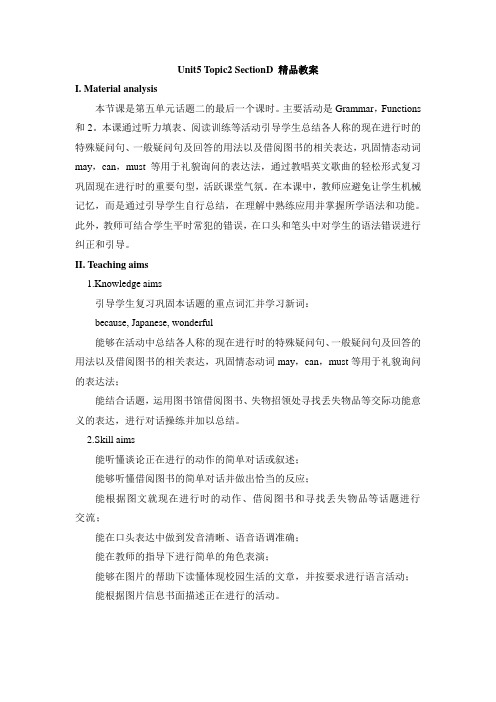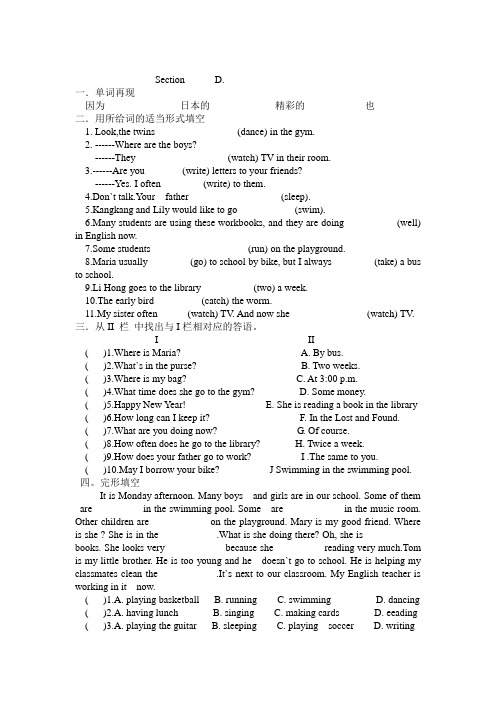七年级Unit5SectionD
- 格式:doc
- 大小:26.00 KB
- 文档页数:1

Unit5 Topic2 SectionD 精品教案I. Material analysis本节课是第五单元话题二的最后一个课时。
主要活动是Grammar,Functions 和2。
本课通过听力填表、阅读训练等活动引导学生总结各人称的现在进行时的特殊疑问句、一般疑问句及回答的用法以及借阅图书的相关表达,巩固情态动词may,can,must等用于礼貌询问的表达法,通过教唱英文歌曲的轻松形式复习巩固现在进行时的重要句型,活跃课堂气氛。
在本课中,教师应避免让学生机械记忆,而是通过引导学生自行总结,在理解中熟练应用并掌握所学语法和功能。
此外,教师可结合学生平时常犯的错误,在口头和笔头中对学生的语法错误进行纠正和引导。
II. Teaching aims1.Knowledge aims引导学生复习巩固本话题的重点词汇并学习新词:because, Japanese, wonderful能够在活动中总结各人称的现在进行时的特殊疑问句、一般疑问句及回答的用法以及借阅图书的相关表达,巩固情态动词may,can,must等用于礼貌询问的表达法;能结合话题,运用图书馆借阅图书、失物招领处寻找丢失物品等交际功能意义的表达,进行对话操练并加以总结。
2.Skill aims能听懂谈论正在进行的动作的简单对话或叙述;能够听懂借阅图书的简单对话并做出恰当的反应;能根据图文就现在进行时的动作、借阅图书和寻找丢失物品等话题进行交流;能在口头表达中做到发音清晰、语音语调准确;能在教师的指导下进行简单的角色表演;能够在图片的帮助下读懂体现校园生活的文章,并按要求进行语言活动;能根据图片信息书面描述正在进行的活动。
3.Emotional aims能够在谈论校园中正在进行的丰富多彩的活动中,发现校园生活的乐趣,从而培养热爱校园生活、乐于参加学校各种活动的意识;能够通过和他人共同完成任务,培养同伴之间的合作精神。
III. The key points and difficult points1.在Sections A~C已学的基础上,能自行总结各人称的现在进行时的特殊疑问句、一般疑问句及其回答的用法以及借阅图书的有关表达,巩固情态动词用于礼貌询问的表达法;2.能在阅读过程中,训练寻读的能力以及在文字信息与图片信息间转换的能力。


Unit 5Do you have a soccer ball?LanguageGoal【语言目标】Be able to talk about ownership.KnowledgeGoals 【知识目标】Key Wordsdo,have,tennis,ball,soccer,volleyball,basketball,let,us,go,we,late,has,get,great,play,sound,interesting,boring,fun,difficult,relaxing,watch,TV,same,love,with,sport,them,only,like,easy,after,class,classmateKey Phrases let’s=let us,watch TV,soccer ballKeySentencesDo you have a ping-pong bat?Yes,I do./No,I don’t。
Do they have a ping-pong ball?Yes,they do。
/No,they don’t.Does she/he have a tennis ball?Yes,she/he does./No,she/he doesn't。
Key Grammar The simple present tenseAbility Goals 【能力目标】Be able to talk about activities and express your own feelings about them。
Moral Goals【情感目标】Form a good habit of loving sports。
Teaching Time【课时】Four periodsPeriod 1Section A(1a-1c)Period 2Section A(2a -3c)Period 3Section B(1a-1d)Period 4Section B (2a-Shelf Check)Period 1 Section A (1a-1c)Teaching important points【教学重点】1.Key words &phrases:do,have,tennis,ball,ping-pong,bat,soccer,soccer ball,volleyball,basketball 2.Key sentences:Do you have a ping-pong bat?Yes,I do.Do you have a ping-pong ball?No,I don't。

Section D.一.单词再现因为____________ 日本的__________ 精彩的_________ 也________ 二.用所给词的适当形式填空1. Look,the twins _______ _______(dance) in the gym.2. ------Where are the boys?------They _______ _________(watch) TV in their room.3.------Are you _______(write) letters to your friends?------Yes. I often ________(write) to them.4.Don`t talk.Your father _______ _________(sleep).5.Kangkang and Lily would like to go ___________(swim).6.Many students are using these workbooks, and they are doing __________(well) in English now.7.Some students ________ _________(run) on the playground.8.Maria usually ________(go) to school by bike, but I always ________(take) a bus to school.9.Li Hong goes to the library __________(two) a week.10.The early bird _________(catch) the worm.11.My sister often______(watch) TV. And now she _____ ________(watch) TV. 三.从II 栏中找出与I栏相对应的答语。


Unit 5 Section D课前预习作业:1、复习现在进行时2、完成Section D Grammar and Functions 以及练习2一、新课导入:以歌曲What Are You Doing? 和游戏Guessing Game导入,复习巩固现在进行时。
二、预习作业检查1、学生在黑板上写出Grammar and Functions答案2、圈出练习2 中出现的活动及划出地方名,然后给图片排序。
三、新课教学1、问题引领:1)现在进行时的句式有哪些?2)如何将动词变成现在分词?2、自主学习:小组讨论,作好记录,将问题以作业形式上交检查。
3、展示交流:竞赛小游戏:学生抢答问题,以此检测学生的熟练掌握程度。
四、解决问题,巩固提高:1、听文章,完成表格。
2、阅读文章,并根据题目要求完成任务。
五、课堂小结We learn:1.some words: because, Japanese,wonderful, also2. some phrases: some photos of his,love doing something。
3. some sentences: Jim loves watching TV in the evening。
六、布置作业:1)预习Topic 3 Section A2)根据图片写一篇短文,描述图中的人正在做什么。
尊敬的读者:本文由我和我的同事在百忙中收集整编出来,本文档在发布之前我们对内容进行仔细校对,但是难免会有不尽如人意之处,如有疏漏之处请指正,希望本文能为您解开疑惑,引发思考。
文中部分文字受到网友的关怀和支持,在此表示感谢!在往后的日子希望与大家共同进步,成长。
This article is collected and compiled by my colleagues and I in our busy schedule. We proofread the content carefully before the release of this article, but it is inevitable that there will be some unsatisfactory points. If there are omissions, please correct them. I hope this article can solve your doubts and arouse your thinking. Part of the text by the user's care and support, thank you here! I hope to make progress and grow with you in the future.。
Section D一.单词再现开始__________ 一会儿__________ 床____________睡觉__________ 上课___________- 去上学___________ 步行________ 去游泳___________ 吃午饭___________ 在学校_____________做家庭作业_______________ 等等____________ 听音乐__________- 每天一次____________ 每年两次______________二.选择( )1.--------_______ do you go to the park?--------Three times a month.A. How oftenB. How soonC. HowD. How old ( ).2It`s good to walk ________ a little while after supper.A. atB. withC. forD. about( )3.------_______ Sally ________early every day?-------Yes, she does.A. Do ,go to bedB. Does , goes bedC. Ia, go to bedsD. Does. go to bed( )4.-------_______ do you usually go to school?-------I usually go to school by bike.A. HowB. How oftenC. How longD. What ( )5.Uncle Wang has a new car. He usually goes to work________.A. In his carB. By his carC. By a carD. On the car ( )6.Kate always _______ a bus to school.A. TakeB. ByC. InD. Takes ( )7.We have _______ vegetables, but we have _______ bread.A.few, a fewB.little ,a littleC.a few, littleD.a little,few ( )8.------You new skirt look very nice. -------____________A. The same to you.B. Thank youC. Very niceD.That`s OK. ( )9.My brother usually plays ______ basketball in the afternoon.A. AB. AnC. TheD./( )10.------How do you often go to school? -------_______ foot.A. On theB. On aC. OnD. By三.情景交际A:Hi.Kangkang.Happy New Year.B:Hi.________________________A:I want to learn about the school life of Chinese students. Could you tell me something about it?B:Yes, I`d love to.A:_________________________B:Some students usualy walk to school, others come to school by bike.A:How many lessons do they have a day?B:They have six.A:__________________________B:Some students have lunch at home. Others have it at school.A:_____________________________ A.How often do they watch TV? B:They often play games,watch TV and so on. B.The same to you.A:________________________________ C.Where do they have lunch? B:About five times a week. D What do they do in their free time.E. How do they usually come to school?。
七年级英语(下)第5单元第1课时
Unit 5 Why do you like pandas?
Section A 1a—2d
一、【教材分析】
二、【教学流程】
三、【板书设计】
四、【教后反思】
七年级英语(下)第5单元第2课时
Unit 5 Why do you like pandas?
Section A 3a—3c
一、【教材分析】
二、【教学流程】
三、【板书设计】
四、【教后反思】
七年级英语(下)第5单元第3课时
Unit 5 Why do you like pandas?
Section B 1a—1d
一、【教材分析】
二、【教学流程】
三、【板书设计】
四、【教后反思】
七年级英语(下)第5单元第4课时
Unit 5 Why do you like pandas?
Section B 2a—3b
一、【教材分析】
三、【板书设计】
四、【教后反思】
2022年4月25日七年级英语(下)第5单元第5课时
Unit 5 Why do you like pandas?
Self Check
一、【教材分析】
三、【板书设计】
四、【教后反思】。
Unit5 Section D
教学目标:
1.音标/t/ /d/ /ts/ /dz/ /tr/ /dr/ /l/ /m/ /n/
2.谈论日常活动。
3.复习一般现在时。
4.复习频度副词。
本课重点: 1,2和5 难点:一般现在时,频度副词。
教具录音机
教学过程:
第一步:复习
1.复习并学习新单词:measure,pleasure,volleyball和while。
2.根据图画猜测单词,看谁读得快而准。
3.听录音1,然后再跟读,学会音标/t/ /d/ /ts/ /dz/ /tr/ /dr/ /l/ /m/ /n/
第二步:呈现
1.请学生两人一组依次谈论他们的日常活动。
A: How do you usually go to school?
B: I usually walk to school.
A: What do you do in your spare time?
B: I often play basketball.
2.表演Section C 1a这个采访活动。
一个表演interviewer,一个表演Michael, 看哪组同学表演最好。
3.谈论自己的日常活动。
如:
I usually get up at 6∶30. / I have breakfast with my parents at 7∶30.
I never come to school late. / Sometimes I walk to school.
第三步:巩固
1.听录音1然后再跟读,学会音标/t/ /d/ /ts/ /dz/ /tr/ /dr/ /l/ /m/ /n/
2.阅读2并且回答下列问题。
How does Jane go to school? / What time do classes begin in the afternoon?
第四步:练习
1.填写第8页的表格,两人一组讨论,据课文内容彼此检查答案。
2.谈论你好朋友的日常活动。
3.听录音3填空。
4.知识点总结:4a和4b。
第五步:综合探究活动完成5。